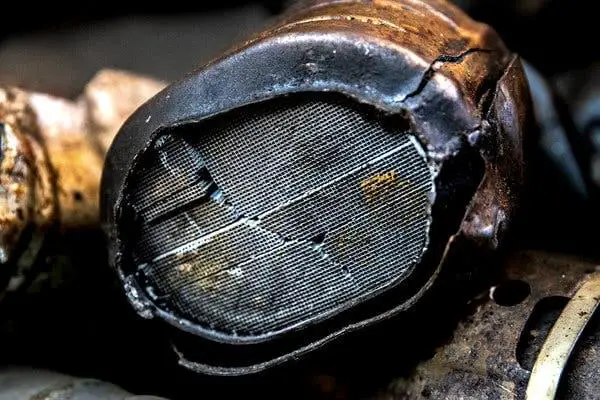
Table of Contents
If you are looking to recycle or scrap your catalytic converter, then one of the first question s you may be asking is how much platinum is in a catalytic converter?
This is a common question to ask since platinum of an important metal extracted from catalytic converters. You may also be asking how to melt platinum from catalytic converters or even how to melt platinum from catalytic converters.
Of course, catalytic converters have other precious metals in them as well including palladium and rhodium, but platinum is normally in the highest amounts.
It is these precious metals that provide the catalytic reactions that occur within the converters since they are burned by the hot gasses.
How Much Platinum Is in a Catalytic Converter?
The amount of platinum in catalytic converter ranges between 3 to 7 grams. However, the amounts do vary based on the model & the manufacturer.
You may be asking which catalytic converters have the most platinum? Well, it depends.
For instance, a car like Toyota contains a small catalytic converter which is half or even less of what industrial CC has.
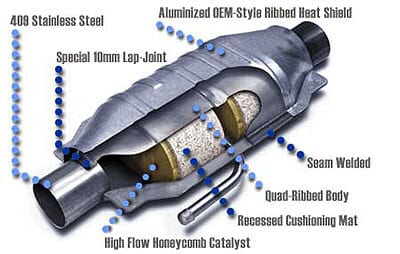
Platinum in a Catalytic Converter
For any modern car, they are fitted with catalytic converters which help to reduce emissions that are harmful to humans and the environment.
The release of gases such as carbon monoxide, nitrogen oxides, and hydrocarbons into the atmosphere is risky.
A catalytic converter normally is incorporated in the car exhaust system used to convert toxic gases into less harmful ones.
How to Recover Platinum from Catalytic Converters?
The majority of car owners don’t see the worth of junk cars that are past their worth. Moreover, these old cars are considered waste and deserve no space in the garage.
Little do they know these worthless cars which are seen as nothing but a rotting metal, endangering the home environment, is a fortune to few who understand.
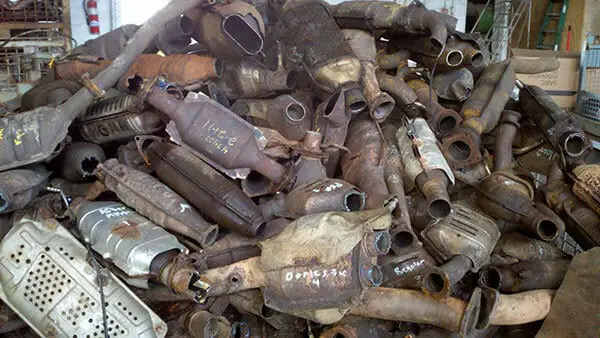
Recover catalytic converter
While many view the junk cars from their physical look and see nothing worthy, under the belly lies the goldmine.
If few were to pick, they would pluck replaceable materials like side mirrors or the engine while the rest is regarded as scrap.
The secret that few know or understand is the rarity of a very worth metal contained in catalytic converters, platinum. Platinum is an important part of a CC and also a most sought precious metal.
Therefore, junk cars are in demand with a focus on Catalytic Converter. If you want to get the treasure, you can do it with a professional or do it on your own following the procedure below:
-
Step 1: Go under the car chassis to remove Catalytic Converter using a flame or a chop saw to get it out. Alternatively, you can use a socket wrench to unscrew the bolts.
-
Step 2: Make sure your hands are protected with gloves as the metal in CC could be harmful when comes into contact with your hands. Split it to open with a flame cutter.
-
Step 3: Once the ceramic honeycomb is exposed, push it out of the case but if dealing with older CC they are found inside the coated pellets.
-
Step 4: You can use something with a flat head like a screwdriver to pry out the platinum coating.
-
Step 5: Now is the time to reap your sweat by selling it to junkyards or enquire areas you can get good returns. Remember, the size of the vehicle matters as small cars are not the same as what you can yield from trucks. Therefore, prior knowledge about the market prices is important.
What Precious Metals are In My Catalytic Converter?
This depends on the type of engine the catalytic converter was removed from.
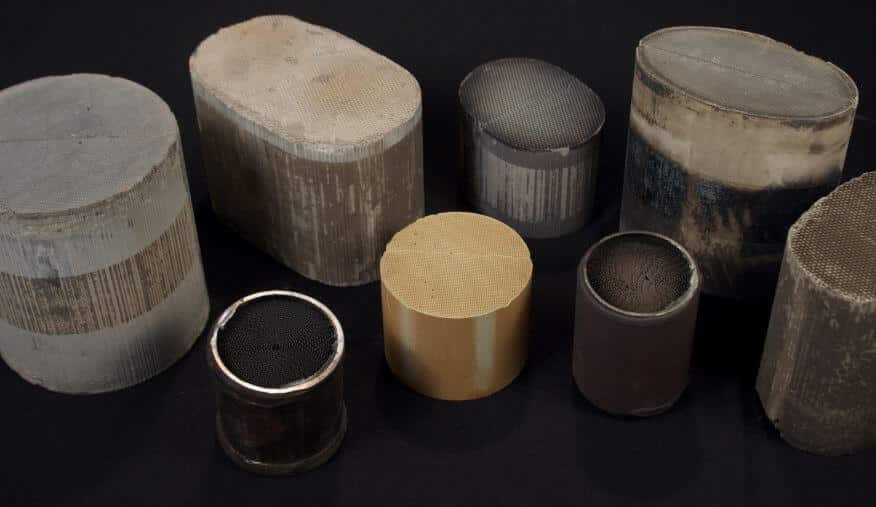
Precious metals in catalytic converter
For gasoline engines, catalytic converters contain platinum, palladium, and rhodium. On the other hand, how much platinum is in a diesel catalytic converter?
For diesel engines, these catalytic converters only contain platinum and rhodium.
How Much Precious Metals Are In Catalytic Converters?
So the question how much platinum is in a catalytic converter actually raises other questions as well.
The proportions of precious metals in a catalytic converter will depend on the age and type of vehicle as well as the catalytic converter used.
Here is a quick reference guide:
- Regular cars, small SUV’s, and motorcycles: These small vehicles average a total within the range of about 2-6 grams.
- Larger-engine cars, mid-large SUV’s and trucks: These larger vehicles average a total within the range of about 6-30 grams.
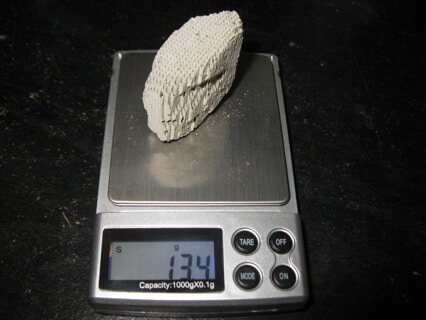
How Much Platinum Is in a Catalytic Converter weight
A couple of years now platinum have not been heavily relied on because of its high price. So, vehicles or Catalytic Converters using gasoline are designed with rhodium & palladium.
In other words, they are known as TWC (Three-Way Catalysts) for they are able to convert hydrocarbons oxides of Nitrogen and carbon monoxide at the same time.
Of the 3 superior metals in Catalytic Converters platinum, palladium & rhodium, only palladium is now highly used today to gasoline vehicles, while platinum and rhodium are used in small bits where necessary.
How Long Does A Catalytic Converter Last?
It’s important that you are asking the right questions. If you are asking how much platinum is in a catalytic converter then you are probably planning on scrapping it.
However, what if the catalytic converter has not yet reached its useful life?
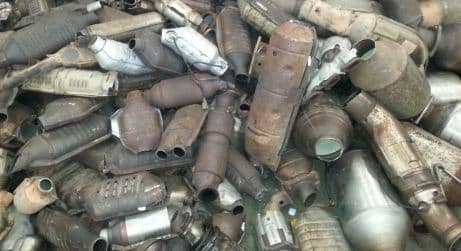
How Long Does A Catalytic Converter Last
How you use your car highly impacts the lifespan of the Catalytic Converter.
There are those car owners that forget whether a vehicle does get faulty a time, so when it happens it gets them unaware.
Taking care of your CC can save you a lot of expenses later as it prolongs the lifespan.
Experts say that, when your car exceeds 60,000 miles going up to 100,000 miles, stay prepared to buy a new Catalytic Converter.
This important part of your exhaust is consumable therefore cannot stay in your vehicle permanently.
The only way to lengthen its lifespan is maintenance through unclogging the CC when cleaning your vehicle though not often.
What is The Most Expensive Catalytic Converter?
The priciest CC belongs to the luxury sports car family. Seems like the more price attached to the vehicle, the more expensive it is for Catalytic Converter.
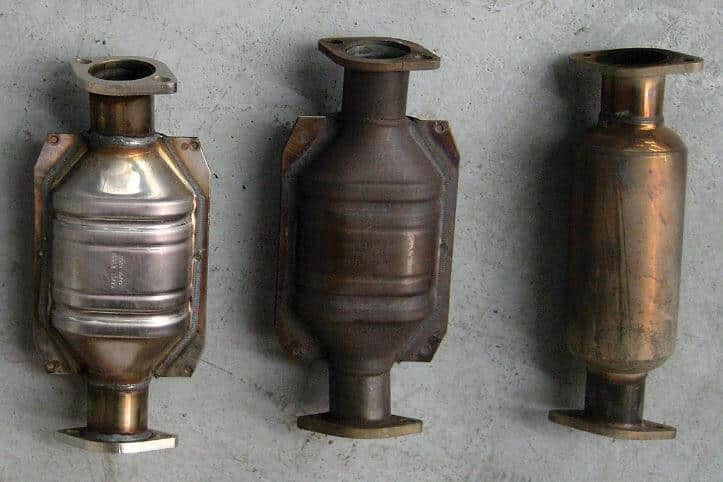
Expensive catalytic converter
- Ferrari F430 CC is considered the most expensive worldwide standing at $3,770. As if that was not enough, the car requires double CC so, that is around $7,500 for both CC.
- The second vehicle with a pricey CC that follows closely to Ferrari is Dodge Ram 2500 asking $3,460
- Ford F250 is the third most expensive CC going at $2,800 which is a slight margin from Dodge Ram.
- For Lamborghini Aventador cost per CC is $3,120 which would have been car number 2 of the most expensive, however, we are focusing on the price of each Catalytic Converter as it requires two CC.
- The last in the list is Ford Mustang going at $1,500
How To Scrap a Catalytic Converter?
So you’ve determined that you want to scrap your old catalytic converter. How do you do it? Really, test best way to go is to have a metals processing service provider do it for you.
These professionals are experienced metal smelters and refiners. Check-in your area is any businesses offer this service.
Not all of them will accept a single catalytic converter to scrap, but some do and most will pay in less than 30 days.
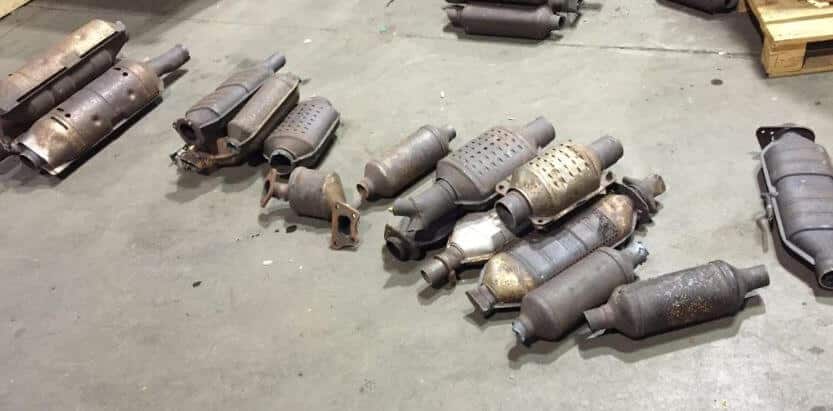
Scrap catalytic converter
We should also mention that most of these metal processors allow you to ship the device to them.
All you will need to do is to use cardboard boxes and place the device on pallets. Also, most of these businesses, especially the larger ones offer freight pickup services as well.
What are The Symptoms of a Bad Catalytic Converter?
If you are used to your car sound, when the CC is bad or failing, you can recognize by observing changes in functionality.
Some of the key areas are:
-
Reduction in engine performance: There are two things that can lead to a reduction in how your engine performs, either your CC is clogged causing a restriction in a good flow of your car exhaust or cracked CC which leads to a gas leak.
-
Failed Emission Test: In the US, some States require vehicles to undergo emission tests to make sure they are not contributing to pollution. It is done by placing a trouble code in your car’s computer and if your car has a faulty CC you will fail the test. Therefore, it is required by law to have your Catalyst Converter replaced.
-
The sulfur smell from the exhaust: A normal functioning exhaust during combustion should convert hydrogen sulfide into odorless but in case you smell sulfur that is a warning with your CC.
-
Rattling Noise: If your Catalytic converter is damaged internally or becomes old, you will start experiencing rattle noise especially when starting the car and it worsens from time to time.
How Much Does A Catalytic Converter Cost?
When your Catalytic Converter gets faulty unexpected rather than sitting on a timely bomb trying to save some dollars going for a repair is not a prudent idea.
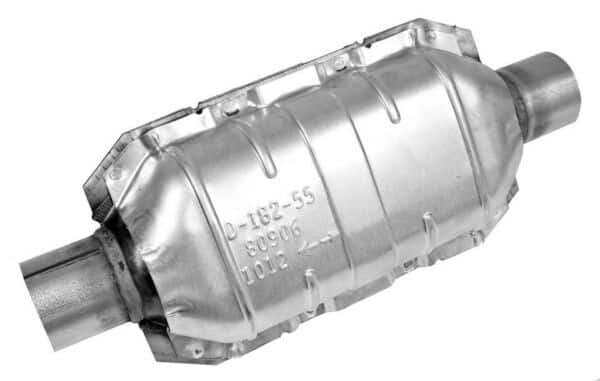
Walker Catalytic Converter
However, the prices mostly depend on the model of your car and the reason for replacement.
The price ranges from $300 to $1700 for the most common Catalytic Converters. On the other hand, prices may change due to CC type, usage, product & durability.
How Do You Clean Your Catalytic Converter?
Knowing how to clean your car CC can save you a load of trouble, especially not dealing with issues of clogging or entirely faulty CC.
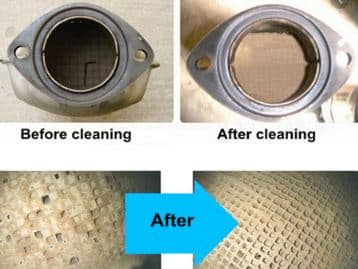
How Do You Clean Your Catalytic Converter
- Empty all the content of the cleaner into your car gas tank as you would want them to be used up
- Once the cleaner content is in the gas tank, run the car until you make sure all of it has been emptied.
- Clear all the OBDII error codes that are present
- Now you can fill the gas tank to capacity
- To re-calibrate OBDII drive your car approximately 50 miles
- Clear the emissions
- Your car Catalytic Converter is clean and completed maintenance, so you can now enjoy the ride as you wait for another similar process
How Car’s Catalytic Converter Can Spark Fire?
For every car owner whose car is running on petrol & diesel should regularly monitor the condition of the CC.
The importance of a Catalytic Converter in a vehicle is to make the environment-friendly by changing the end result of the burned gas.
However, if the car has a problem the stress can reach Catalytic Converter and make it heat up within seconds creating more problems.
During summer, such instances or where the CC gets clogged up it can hit up to 1200% which is dangerous when comes into contact with a flammable substance or dry glass.
In some cases, flames erupt in the process. Weather conditions can easily make the fuel ignitable if the CC does not experience good flow.
What Are Potential Issues With a Catalytic Converter?
Most car owners register changes with Catalytic Converter after 10 years. Some of the serious issues to expect after this period are:
- Physically Catalytic Converter getting damaged
- Clogging issues
- Dealing with sluggish engine
- The CC getting overheated
Very many things can cause your CC lifespan to get cut short. If you are a rough driver and not care about the effect CC can have when exposed to violent driving, blame it not to the gadget.
When used to Running over a curb or road debris that is another area the CC can develop problems. On the other hand, leaded gas is one potential contaminant which is a big culprit in destroying the catalyst.
However, in countries like the US is not there. Also, engine coolant can have a leak affecting the combustion system due to defective engine oil & cylinder head gasket.
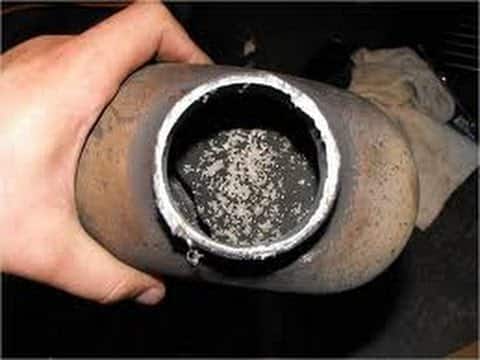
Clogged catalytic converter
You know, athletes require lots of oxygen and so are the car engines. Therefore, your car engine suffers the most when the exhaust experiences improper flow.
The fluid leak can clog the CC restricting normal gas flow. Moreover, if there is excessive unburned gas, it can overheat the CC caused by a holey exhaust valve or backfiring spark plug.
What Can I Do to Protect My Car’s Catalytic Converter?
Recycling of Catalytic Converters is big business nowadays. Mostly, this is led by the constant demand for scarce Platinum Group Metals (PGM) found in the CC.
There are dozens of companies that are active in the recycling business of Catalytic Converters and now thieves have taken advantage of this demand.
For you to avoid becoming a victim of a stolen Catalytic Converter, follow the tips below to be on the safe side.
- Where you park your vehicle matters a lot, as thieves target cars in places that cover their ill motives from being exposed. Therefore, it is sensible to park near the building entry point and areas that are well lit.
- Ensure your car has an alarm set to sense vibrations
- You can have a good mechanic to have your Catalytic Converter welded safely to make it harder for thieves from stealing.
- Another superb idea is to engrave Vehicle Identification Number (VIN) on your CC to alert scrap dealers. This way you will be notified when it is taken there for sale.
- It is advantageous to you if you have a garage, where you can lock your car to deter illegal access.
It may seem like a costly idea to protect your Catalytic Converter from thieves but it is more costly to replace a stolen one. So, you can balance the two and see the benefit of staying safe at all time.
What Cars Are Thieves Looking For Catalytic In Converters?
Since scrapping catalytic converters is so alluring, people will steal them. As the search for Catalytic Converter continues to soar across the world, thieves are getting smarter by day. Fuel-powered vehicles are the most targeted.
They appeal to thieves for their raised body which gives them access to the vehicle belly with ease. Additionally, Catalytic Converters gotten from such vehicles (SUVs or pickup trucks) fetch good money than small cars.
To avoid attracting thieves to your vehicle, do not park in one place for too long or shopping malls with a crowded parking lot.
How to Avoid Catalytic Converter Theft?
As the demand for Catalytic Converter rises, car owners are having a hard time safeguarding their CC.
If your Catalytic Converter is stolen, you have no choice but to replace it as the law states all cars to be fitted with it.
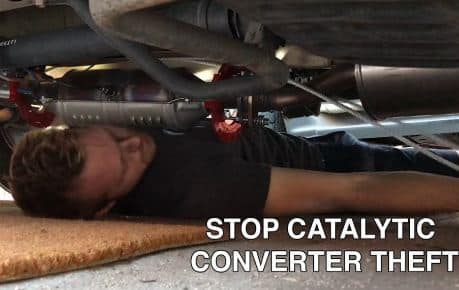
How to Avoid Catalytic Converter Theft
However, things may change for the better as recycling companies are under surveillance on how they do the processing.
For instance, three years ago, Spring Valley recycling company was unable to provide enough evidence about their buying procedure, which got them fined $90,000.
According to the Business and Professions code, all recycling companies are required to gather enough information from CC sellers.
Some of the useful information they are required to gather is Vehicle Identification Number (VIN), the reason for selling and whether they are real owners of the device.
Moreover, sellers should wait for three days before receiving their payment as police are given time to verify the information provided.
Recap
There you have it, the answer to the question of how much platinum is in a catalytic converter.
Whenever we talk about scrapping automobile parts, we should take caution to note that this should never be an individual effort unless you are training in chemistry, metallurgy or hazardous metal extraction.
Otherwise, you can simply sell the scrap metals to one of the several companies around that specialize in this type of extraction and processing Here’s one example.
 by
by